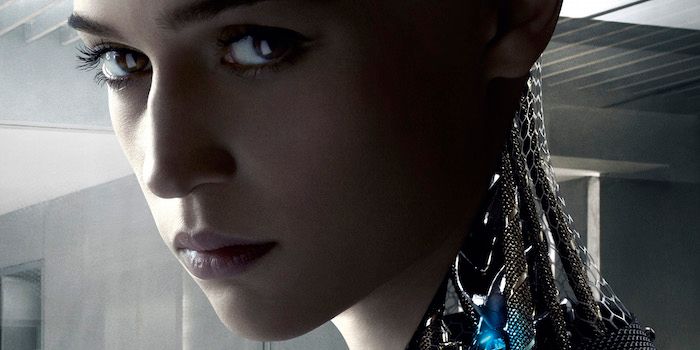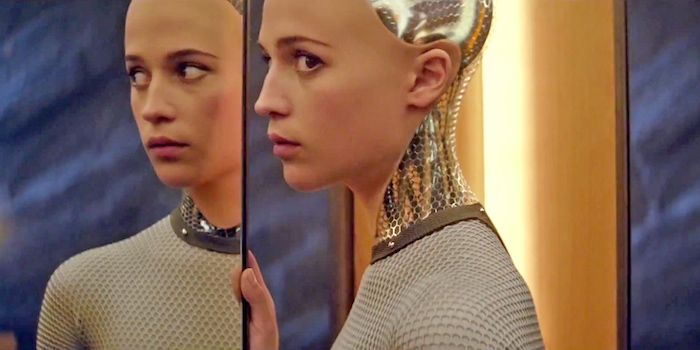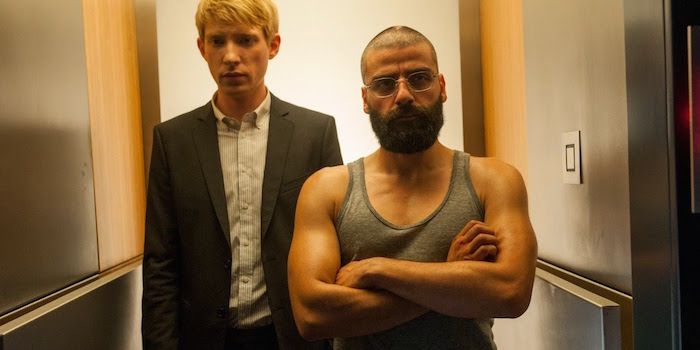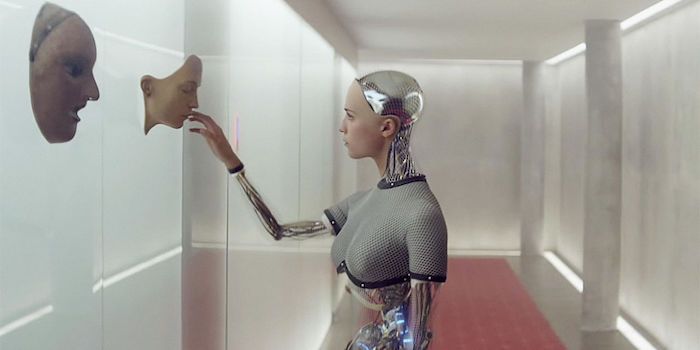Ex Machina is memorable and downright challenging, full of sharp performances that blur the lines between humanity and programming.
In the near-future, young computer coder Caleb Smith (Domhnall Gleeson), working for the world's most powerful tech company, is selected to assist in an unorthodox experiment. Caleb travels far from his office job to an isolated homestead, and research facility, of the company's reclusive CEO, Nathan Bateman (Oscar Isaac) for a weeklong visit. However, when the eager employee actually meets his employer, Caleb finds that, in his isolation, Nathan has become unhinged and obsessive - rarely seen without an alcoholic drink in hand.
Nevertheless, when Nathan reveals to Caleb the purpose of his visit, the coder dismisses his initial discomfort (and fear) in favor of jumping head-long into scientific discovery. Hidden away in his compound, Nathan has been working on an advanced artificial intelligence named Ava (Alicia Vikander) - and has brought Caleb in as a consultant, hoping the programmer can successfully administer a Turing Test: intended to determine if an A.I.'s personality and self-awareness is equal or greater than a flesh-and-blood human (meaning the A.I.'s "artificial" intelligence is imperceptible to "normal" people).
Ex Machina marks the directorial debut of 28 Days writer Alex Garland - a name that should be familiar to viewers of other fan-favorite genre stories: Sunshine and Dredd, especially. While Garland didn't spend much time in a director's chair prior to his work on Ex Machina (depending on how much you believe about the upheavals on Dredd's set), the acclaimed novelist and screenwriter has collaborated closely with several high-profile filmmakers (including Danny Boyle). As a result, while certain moviegoers might be skeptical that a freshman filmmaker could deliver a thought-provoking, visually arresting, and outright haunting sci-fi story, Ex Machina is definitive proof of Garland's talent on the page and behind the camera.
Indicated by Garland's choice of titling (a play on the latin phase: deus ex machina, "a god from the machine"), audiences should proceed with clear expectations: Ex Machina is not a mainstream sci-fi thriller, it's a contemplative character study that juxtaposes intelligence and the "human" soul - in a stream of dense philosophical and technical rumination. Garland doesn't abuse his viewers with technobabble but he does expect them to keep up. Beyond three engaging leads and brainy sci-fi storytelling, Ex Machina is a movie about questions and debate - both layered into the subtext and full-on portrayed in scenes of interview as well as, at times, interrogation.
Fresh off a well-received performance in About Time (and gearing up for a lead role in Star Wars: The Force Awakens), Domhnall Gleeson is an absorbing and empathetic stand-in for the film's audience - a wide-eyed optimist quickly enamored by Nathan's creation. In most scenes, Gleeson is playing the straight man, a sounding board to educate and challenge viewers but, even though the actor offers a quality performance, he's often overshadowed by his co-stars - especially Isaac. Even in a film starring a sentient artificial intelligence, Isaac's Nathan is a fascinating and entertaining addition - a man that embodies the conflicted nature of humankind: a creative savant, crippled by his own intellect, exiled in a prison (both mental and physical) of his own invention.
In any other movie, Isaac's tortured genius would steal the show but, unsurprisingly, Ex Machina's Ava (played by Alicia Vikander) succeeds as the main attraction - and the crux on which the film comes full circle. Vikander's layered performance required a subtle touch (she is, after all, a person playing an artificial intelligence that is near-indistinguishable from a real human) - to ensure that Ava is neither too human or too robotic. It is Vikander's vulnerable portrayal that keeps Ava locked in a captivating middle ground - forcing Caleb, Nathan, and Ex Machina's audience to face a range of complicated human emotions: wonder, uncertainty, and fear, along with some flat-out challenging questions that our world (outside of the theater) will inevitably have to ask in the not-too-distant future.
That said, after a brave and alluring performance from Vikander, android Ava was brought to life through an inventive mix of live-action and CGI (via the combined efforts of Millennium FX, Double Negative, and Milk VFX), as well as beautiful cinematography from Rob Hardy. It's fair to say that in addition to being one of the most thought-provoking science fiction films of late, Ex Machina is also one of the most visually arresting.
Ex Machina is memorable and downright challenging, full of sharp performances that blur the lines between humanity and programming - as well as twists that playfully defy the film's audience. It's an art-house movie, one that may move too slow or spend too much time in subtle reflection for casual viewers, but that doesn't mean Garland has missed his mark. Tracing a careful line between good and evil, genius and insanity, as well as soul and soullessness, Ex Machina is a captivating viewing - one that will leave moviegoers with plenty to contemplate.
TRAILER
_____________________________________________________________
Ex Machina runs 108 minutes and is Rated R for graphic nudity, language, sexual references and some violence. Now playing in theaters.
Let us know what you thought of the film in the comment section below. If you’ve seen the movie and want to discuss details about the film without worrying about spoiling it for those who haven’t seen it, please head over to our Ex Machina Spoilers Discussion.
For an in-depth discussion of the film by the Screen Rant editors check back soon for our Ex Machina episode of the SR Underground podcast.
Agree or disagree with the review?




